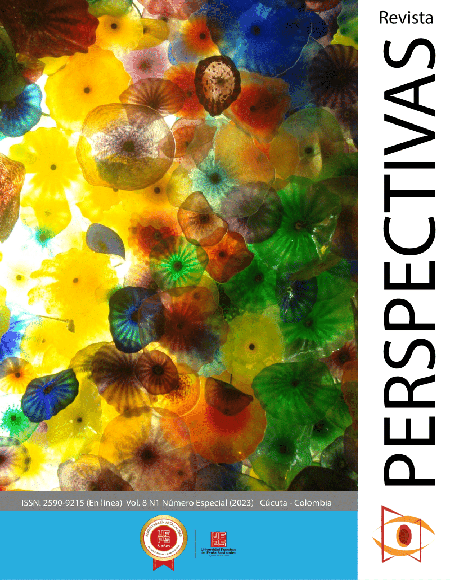The teaching and learning of literature in the age of ICTs
La enseñanza y el aprendizaje de la literatura en tiempos de las TIC
Main Article Content
This article is the synthesis of a research work that focused on the disinterest towards the traditional methods of teaching and learning literature at the University of Cartagena. For this purpose, the use of technology was proposed, through the design of a website, exploring new and creative tools, which generated a different expectation towards literary work. Such a bet was possible through the observation of classes, interviews and surveys to teachers, administrators and students of the linguistics and literature program of the alma mater, obtaining favorable results, which made it viable to create this intervention proposal. This led to the conclusion that the udeceista community should not turn its back on technological advances and the development of society and include them, with the appropriate adjustments, in its research and academic plans. The article is divided into three essential moments: the first consists of a review of the legal literature that facilitates the use of technology in education and makes possible the statement of the problem, objectives and justification. The second shows the methodological route followed to carry out the design proposal, and the third shows the results, discussion and conclusion that supported this pedagogical initiative on the use of ICT to strengthen the knowledge of the literature
Downloads
Article Details
Banco mundial (2022) https://www.bancomundial.org/es/topic /education/overview
Bautista, N. (2021) Proceso de la investigación cualitativa. [Archivo PDF] https://books.google.es/books?id=yr2 CEAAAQBAJ&lpg=PT13&ots=1yN4qU MPDo&dq=%20la%20investigaci%C3%B3n%20cualitativa&lr&hl=es&pg=PA1#v=o ne page&q=la%20investigaci%C3%B3n% 20cualitativa&f=false
Colás, P. y De Pablos, J. (2012) Aplicaciones de las tecnologías de la información y la comunicación en la investigación cualitativa. [Archivo PDF] https://www.jstor.org/stable/23766440 Conejero, J. (2020) Una aproximación a la investigación cualitativa. [Archivo PDF]
https://www.neumologia-pediatrica.cl/i ndex.php/NP/article/view/57/57
Correa, F. (2008) Ambiente de formación en el siglo XXI [Archivo PDF] https://revistas.unal.edu.co/index.php/ email/article/view/12622/13226
De Benito, B. y Salinas, J. (2016) La Investigación Basada en Diseño en Tecnología Educativa. [Archivo PDF] file:///C:/Users/usuario/Downloads/260 631-Texto%20del%20art%C3%ADculo-907 561-3-10-20160720.pdf
Forero, L. y Romero, M. (2020) Usos didácticos de las TIC para la educación literaria en la escuela. [Archivo PDF]
http://repository.pedagogica.edu.co/bit stream/handle/20.500.12209/12129/U sos%20 did%C3%A1cticos%20de%20las%20T IC.pdf?sequence=6&isAllowed=y
Guevara, G., Castro, N. y Verdesoto, A. (2020) Metodologías de investigación educativa (descriptivas, experimentales, participativas, y de investigación-acción) [Archivo PDF] https://www.recimundo.com/index.php/ es/article/view/860/1363
Hernández, D., Ramírez-Martinell, A. y Cassany, D. (2014) Categorizando a los usuarios de sistemas digitales. [Archivo PDF]
https://idus.us.es/bitstream/handle/114 41/45818/Categorizando%20a%20los %20usu arios%20de%20sistemas%20digitales. pdf?sequence=1&isAllowed=y Ley 1341 del 2009. Por la cual se definen principios y conceptos sobre la sociedad de la información y la organización de las Tecnologías de la Información y las Comunicaciones (TIC), se crea la Agencia Nacional de Espectro y se dictan otras disposiciones. Julio 30 de 2009. D. O. N°. 47426 https://www.funcionpublica.gov.co/eva/ gestornormativo/norma.php?i=36913
Ley 1978 de 2018. Por la cual se moderniza el Sector de las Tecnologías de la Información y las Comunicaciones -TIC, se distribuyen competencias, se crea un Regulador Único y se dictan otras disposiciones. Julio 25 de 2019. D.O. https://www.funcionpublica.gov.co/eva/ gestornormativo/norma_pdf.php?i=982 10
Martínez, R. y Rodríguez, M. (2020) Las tecnologías y la enseñanza de la literatura. Una experiencia práctica. [Archivo PDF]
http://scielo.sld.cu/scielo.php?script=s ci_arttext&pid=S2218-3620202000020 0116
Mishra, P., y Koehler, M. J. (2006). Technological pedagogical content knowledge: a framework for teacher knowledge. Teachers College Record, 108(6), 1017-1054. DOI: https://doi.org/10.1177/016146810610800610
OCDE (2019) El trabajo de la OCDE sobre educación y competencias https://www.oecd.org/education/El-trabajo-de-la-ocde-sobre-educacion-y- competencias.pdf
Organización de las Naciones Unidas [ONU]. (2015). Objetivo 4. Educación de calidad. https://www.un.org/sustainabledevelop ment/es/education/MinTIC (2018) Plan tic 2018 – 2022 El futuro es de todos https://micrositios.mintic.gov.co/plan_ti c_2018_2022/pdf/plan_tic_2018_2022_20191121.pdf
Morin, Edgar. (1999) Los siete saberes necesarios para la educación del futuro. UNESCO.
Quintana, A. (2006) Metodología de Investigación Científica Cualitativa [Archivo PDF] http://www.ubiobio.cl/miweb/webfile/m edia/267/3634305-Metodologia-de- Investigacion-Cualitativa-A-Quintana.p df
Rodríguez, M. y Barragán, H (2017) Entornos virtuales de aprendizaje como apoyo a la enseñanza presencial para potenciar el proceso educativo. [Archivo PDF] file:///C:/Users/usuario/Downloads/Dial net- EntornosVirtualesDeAprendizajeComo ApoyoALaEnsenanz-6297476.pdf
Romero, D. (2020) Descubre cómo funcionan los Ambientes Virtuales de Aprendizaje (AVA) y qué aportan a la educación. [Archivo PDF] https://rockcontent.com/es/blog/ambie ntes-virtuales-de-aprendizaje/
Unicartagena (2020) Acuerdo 20 de julio del 2020. Por medio del cual se adopta la Política Curricular de la Universidad de Cartagena” https://drive.google.com/file/d/1n_lPM EuAVCbgX_0rO-yFVg0TZ8TFP4P8/vi ew
Urbano, P. (2016) Análisis de datos cualitativos. [Archivo PDF] https://revistas.umariana.edu.co/index. php/fedumar/article/view/1122/1064
Vygotsky, L. (1995) Pensamiento y Lenguaje. [Archivo PDF] https://abacoenred.com/wp- content/uploads/2015/10/Pensamiento
-y-Lenguaje-Vigotsky-Lev.pdf







